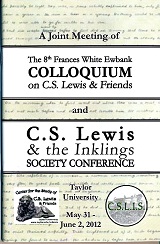Event Title
Academic Paper Session 2-C
Location
Smith-Hermanson 151
Start Date
1-6-2012 10:30 AM
Description
"The Intertwining of Reason and Imagination: Casting Truth in an Imaginary World" - Sharon Kotapish
When writing The Chronicles of Narnia, did C.S. Lewis deliberately turn from the world of reason and abandon logical argument? Or did he gravitate toward imaginative fiction because story may be the best way to communicate certain kinds of truth? Just as the Narnia tales reflect major themes in Lewis' overtly Christian nonfiction works, many of the truths taught by Jesus through parable are paralleled in the Apostle Paul's expository letters. By reading a passage from Lewis'' nonfiction writing along with a reflected passage from the Chronicles, our understanding and appreciation of both are deepened.
"C.S. Lewis, Charles Williams, and the Necessity of the Terrible Good" - Kimberly Moore-Jumonville
Through characters like Eustace, Psyche, and Orual, and others, Lewis reminds us that transformation from what we now are is a necessity if we wish to know God. We must relinquish the lies we blindly wear and be stripped to the bone; ironically, we have to go under the water so that we don't drown or die of thirst. Pauline, of Charles Williams's Descent into Hell, "was not yet prepared to accept the terror of good" (107), but she learns that "the Lord does things in the midst of a fire" (93). Pauline's salvation lies in relinquishing her fear to a friend and simultaneously facing her doppelganger, her double. That courage leads to her freedom from fear. Thus, a study of Lewis's and Williams's treatments of the fierceness of good clarifies that the terrible good is a purgation necessary to free the shrinking soul for its deepest soul work.
"Between Two Strange Hearts: Spiritual Desolation in the Later Poetry of Gerard Manley Hopkins and Charles Williams" - Sørina Higgins and Rebecca Talbot
Spiritual desolation, while a perennial human experience, is expressed in historically-determined diction. Gerard Manley Hopkins (1844-1889) and Charles Williams (1886-1945) are an interesting case study, especially as Hopkins shaped Williams' later prosody. "My Own Heart" (Hopkins) shares desolation with Ignatius' Spiritual Exercises, and reading "My Own Heart" through Williams theory of spiritual "schism" as literary analysis reveals a cleft self similar to the split kingdom in "Prayers of the Pope" (Williams). Neither writer excludes hope: Hopkins' Ignatian language frames "My Own Heart" as a hopeful surrender, while Williams offers hope via occult vocabulary.
Event Type
Paper
Academic Paper Session 2-C
Smith-Hermanson 151
"The Intertwining of Reason and Imagination: Casting Truth in an Imaginary World" - Sharon Kotapish
When writing The Chronicles of Narnia, did C.S. Lewis deliberately turn from the world of reason and abandon logical argument? Or did he gravitate toward imaginative fiction because story may be the best way to communicate certain kinds of truth? Just as the Narnia tales reflect major themes in Lewis' overtly Christian nonfiction works, many of the truths taught by Jesus through parable are paralleled in the Apostle Paul's expository letters. By reading a passage from Lewis'' nonfiction writing along with a reflected passage from the Chronicles, our understanding and appreciation of both are deepened.
"C.S. Lewis, Charles Williams, and the Necessity of the Terrible Good" - Kimberly Moore-Jumonville
Through characters like Eustace, Psyche, and Orual, and others, Lewis reminds us that transformation from what we now are is a necessity if we wish to know God. We must relinquish the lies we blindly wear and be stripped to the bone; ironically, we have to go under the water so that we don't drown or die of thirst. Pauline, of Charles Williams's Descent into Hell, "was not yet prepared to accept the terror of good" (107), but she learns that "the Lord does things in the midst of a fire" (93). Pauline's salvation lies in relinquishing her fear to a friend and simultaneously facing her doppelganger, her double. That courage leads to her freedom from fear. Thus, a study of Lewis's and Williams's treatments of the fierceness of good clarifies that the terrible good is a purgation necessary to free the shrinking soul for its deepest soul work.
"Between Two Strange Hearts: Spiritual Desolation in the Later Poetry of Gerard Manley Hopkins and Charles Williams" - Sørina Higgins and Rebecca Talbot
Spiritual desolation, while a perennial human experience, is expressed in historically-determined diction. Gerard Manley Hopkins (1844-1889) and Charles Williams (1886-1945) are an interesting case study, especially as Hopkins shaped Williams' later prosody. "My Own Heart" (Hopkins) shares desolation with Ignatius' Spiritual Exercises, and reading "My Own Heart" through Williams theory of spiritual "schism" as literary analysis reveals a cleft self similar to the split kingdom in "Prayers of the Pope" (Williams). Neither writer excludes hope: Hopkins' Ignatian language frames "My Own Heart" as a hopeful surrender, while Williams offers hope via occult vocabulary.


